Australian universities rank among the best in the world, reputed as much for the quality of their academic programs and facilities as for their campus culture and social diversity. With the majority of students (76%) surveyed by Canstar Blue recognising that their university degree was vital for their future career prospects and 56% remembering university as the best time of their life from a social perspective, it’s clear that university provides more than just an education.
That’s why choosing the right university is an important decision. And from study options and career paths to campus life, student support, and where your friends go, there are many things to consider when making that choice.
Canstar Blue surveyed more than 1,658 current students and graduates of the past 10 years to identify the universities students rated the best in Australia. There are many university ratings out there, but for this survey, Canstar Blue asked students to rate their university on a range of factors that are important to them to understand how satisfied they are overall with their university experience. Please see our methodology here.
The winning university is the one that receives the highest overall satisfaction rating once all the scores from the overall satisfaction criteria are combined and averaged.
Universities must have received at least 30 responses to be included, so not all universities available in the market have been compared in this survey. In our 2024 student satisfaction review of the 40-plus public and private universities in Australia, we collected sufficient data for 44 universities (assessed by domestic and international students) to be included in our ratings. So, which are the highest-rated universities in Australia for student satisfaction?
Here are the universities in Australia that were included in Canstar Blue’s 2024 student satisfaction survey, listed below in alphabetical order.
| University | State(s) |
| Australian Catholic University | NSW, VIC, QLD, WA, SA, ACT |
| Australian College of Applied Psychology | NSW, VIC, QLD, SA |
| Australian National University (ANU) | ACT |
| Bond University | QLD |
| Central Queensland University (CQU) | QLD, VIC, NSW, WA, SA |
| Charles Darwin University | NSW, NT |
| Charles Sturt University (CSU) | NSW, VIC, QLD |
| Curtin University | WA |
| Deakin University | VIC |
| Edith Cowan University (ECU) | WA, NSW |
| Endeavour College of Natural Health | QLD, VIC, NSW, SA, WA |
| Federation University of Australia | VIC |
| Flinders University | SA |
| Griffith University | QLD |
| James Cook University | QLD |
| La Trobe University | VIC |
| Macquarie University | NSW |
| Monash University | VIC |
| Murdoch University | WA |
| Open Universities Australia | Online |
| Queensland University of Technology (QUT) | QLD |
| RMIT University | VIC |
| Southern Cross University | QLD, NSW |
| Swinburne University of Technology | VIC |
| Torrens University | QLD, NSW, VIC, SA |
| University of Adelaide | SA |
| University of Canberra | ACT |
| University of Melbourne | VIC |
| University of New England (UNE) | NSW |
| University of Newcastle | NSW |
| University of New South Wales (UNSW) | NSW |
| University of Notre Dame | NSW, WA |
| University of Queensland (UQ) | QLD |
| University of South Australia (UniSA) | SA |
| University of Southern Queensland (USQ) | QLD |
| University of the Sunshine Coast | QLD |
| University of Sydney (USYD) | NSW |
| University of Tasmania (UTAS) | TAS |
| University of Technology Sydney (UTS) | NSW |
| University of the Sunshine Coast (USC) | QLD |
| University of Western Australia (UWA) | WA |
| University of Wollongong (UOW) | VIC |
| Victoria University (VU) | VIC |
| Western Sydney University (WSU) | NSW |
Our ratings reveal which Australian universities were rated best (five stars) for overall student satisfaction nationally and by state.
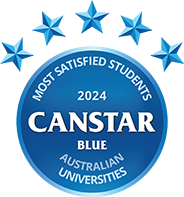
Aussies have rated Australian National University as number one in Canstar Blue’s latest Australian university ratings, with five-star reviews for teaching staff, opportunities and career prospects after graduation, learning resources, student support available and overall satisfaction.
Australian National University (ANU) has six campuses and facilities across Australia offering a variety of courses. Students can choose to study from seven academic colleges, including Arts and Social Sciences, Business and Economics, and Health and Medicine.
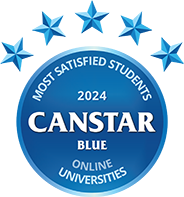
The University of Sydney received five stars for quality of education received, learning resources, opportunities and career prospects after graduation, teaching staff and overall satisfaction.
The University of Sydney was established in 1850 and has a number of campuses across New South Wales. Academic colleges include Architecture, Design and Planning, Education and Social Work, and Music.
Read more: The best-rated online universities in Australia
Below are the highest-rated universities in each state. Click on the relevant link for your state for more information on state ratings.
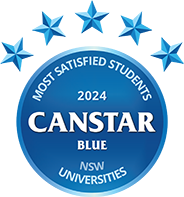
Charles Sturt University received five stars for quality of education received, opportunities and career prospects after graduation, student support available, campus amenities and overall satisfaction.
Charles Sturt University is a regional school based in locations across New South Wales, Victoria and the ACT. The university’s facilities include community health clinics, sport and recreation grounds and a community radio station.
Read more: The best-rated universities in New South Wales
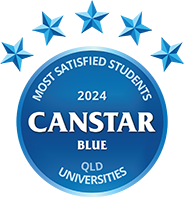
The University of Queensland received five stars for learning resources, quality of education received, opportunities and career prospects after graduation, teaching staff and overall satisfaction.
The University of Queensland (UQ) is based in Brisbane and was the first university to be established in Queensland, in 1910. UQ has a number of research institutes including the Institute for Molecular Biosciences and the Queensland Brain Institute.
Read more: The best-rated universities in Queensland

The University of Adelaide received five stars for teaching staff, quality of education received, learning resources, campus amenities and overall satisfaction.
The University of Adelaide has three campuses in South Australia and one in Victoria. The school’s academic faculties are Arts, Business, Law and Economics, Health and Medical Sciences and Sciences, Engineering and Technology.
Read more: The best-rated universities in South Australia
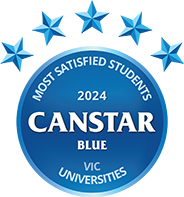
The University of Melbourne received five stars for teaching staff, quality of education received, learning resources, campus amenities, student support available and overall satisfaction.
The University of Melbourne was founded in 1853 and has seven campuses across Melbourne and greater Victoria. The university has over 15 cultural facilities housing physics, art and historical displays.
Read more: The best-rated universities in Victoria
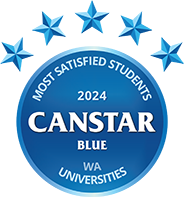
Murdoch University received five stars for learning resources, teaching staff, quality of education received and overall satisfaction.
Murdoch University has locations across Western Australia as well as in Dubai, Singapore and Malaysia. The university’s colleges are Business, Environmental and Life Sciences, Health and Education, Law, Arts and Social Sciences, and STEM.
Read more: The best-rated universities in Western Australia
Current and past students surveyed by Canstar Blue were asked to name the key reasons for choosing their university. The main factors identified included the reputation of the university, acceptance of enrollment from the university and the physical location of the campuses. These are the reasons students and graduates cited for choosing their university:
We cover some of these factors in more detail below.
Our research revealed that more than a third of survey respondents (37%) visited their university campus before attending university. This is a good way to familiarise yourself with your new place of study and to ensure it has all the amenities and facilities you need for successful university life. Facilities and amenities you might want to consider could include access to public transport, adequate parking, lockers, libraries, cafeterias, Wi-Fi – and a university bar or entertainment facilities. More than a third of respondents to our survey (37%) used the amenities available on campus such as those mentioned above, while 46% said their university provided modern facilities relevant to their study discipline (i.e. science labs, media rooms, computer labs, etc).
Having a good academic and social support system while at university can also make it easier to stay the course and succeed in your studies. Half of the students surveyed (50%) said they learned a lot from their university tutors, and 36% reported having learned from their peers as well.
The COVID-19 pandemic saw most of the higher education sector transition to online and remote learning to facilitate studying from home and to support students in completing their studies during unprecedented times. However, ‘hybrid learning’ − whereby students attend some classes in person and some virtually from home − is here to stay. In fact, a quarter of past and current students we surveyed (30%) undertook some kind of online study, while 26% tried a mixed model of in-person and virtual classes.
Technology has made online learning far more accessible in a rapidly changing world, as well as providing students with greater opportunities to tailor their education to their needs. A good online learning program also makes university study more accessible for working adults who need to incorporate education into their busy lives and for those who require flexibility around course workloads and times. Online study options are also worth considering if nearby universities don’t offer programs in your study field.
Read more: The pros and cons of online learning
If you’re unsure of which university to choose, a good first step can be to ask those closest to you who attended university for their feedback on these institutions and use that as a starting point for your independent research. Of the students we surveyed, 18% chose their university because their friends or family went there.
Going to university can be as much about networking and making industry connections as it is about receiving a high-quality education. A third of the students we surveyed (36%) generally looked back at their time at university fondly, and 51% said their university had a welcoming and supportive culture. The majority of respondents also said that university was the best time of their lives from a social perspective.
Read more: The benefits of studying in Australia
Canstar Blue has a collection of the best deals on student phone plans in Australia. Find out if you could save more on a new phone plan.

This article was written by Canstar Blue Home & Lifestyle Content Producer, Rachel Bollerman. Rachel graduated with a Bachelor of Communications, majoring in Journalism at the Queensland University of Technology. She has worked in a variety of public relations, marketing and communications roles, gaining experience in community management, social media marketing, blog writing and other styles of copywriting. When she’s not working, Rachel enjoys doing arts and crafts projects at home and spending time with friends.

Samantha Howse is Canstar Blue’s Consumer Research Specialist, coordinating the consumer research program behind our customer satisfaction awards across Canstar and Canstar Blue in Australia and New Zealand. Sam has earned a Bachelor of Business (Marketing) from Griffith University and, with seven years in market research and two years in marketing, she is experienced in survey design, implementation and analysis, coupled with an understanding of marketing principles and best practice.
Undergraduate degrees that typically take three to four years can cost anywhere between $20,000 and $100,000 in total for Australian citizens studying in a Commonwealth Supported Place (CSP), where the government pays part of your fees. This includes some universities, Technical and Further Education (TAFE), and other higher education providers. Tuition fees for international undergraduate students are more expensive and vary between $15,000 and $40,000 per year. International students pay more in tuition fees because most aren’t eligible for government subsidies like HECS-HELP. We’ve got an article that explains the cost of university in Australia further if you’re considering formal study.
There are scholarships, grants and bursaries available to domestic and international students across both the higher education and vocational sectors. Some common scholarship programs include the Australia Awards Scholarships and the International Postgraduate Research Scholarships (IPRS). Most universities also have their own scholarship programs. Scholarships are awarded based on merit and applicants typically have to demonstrate their suitability for the scholarship. There are no qualifying exams for scholarships in Australia. Here’s more information on getting a scholarship in Australia if you’d like to explore your eligibility.
You can generally switch university degrees if you decide that what you’re studying isn’t right for you or for other professional or personal reasons, although this may not apply to scholarship students. It may be advisable to check out switching options when comparing universities before you decide on a particular institution. And if you’re already enrolled in a course program and wish to switch, you may need to talk to your department office or course tutor about possible credit point transfers. Keep in mind that you’ll need to satisfy your preferred degree’s entry requirements before you can apply.
Our research revealed that just over 12% of students switched their university degrees. When asked about the reasons for the change, they said:
There are many benefits to studying in Australia. As home to some of the world’s top universities as ranked in the QS World University Rankings and other world rankings, Australia is the third most popular destination for international students in the English-speaking world, behind only the US and the UK, according to Study Australia.
Some of the main benefits of studying in Australia include:
The QS World University Rankings rate the world’s top universities and feature more than 1,300 higher education institutions from around the world. The Massachusetts Institute of Technology (MIT), the University of Oxford, Stanford University, the University of Cambridge and Harvard University are typically ranked high on this list. If you’re looking for top-ranked universities in your state or city, you can filter the QS World University Rankings by location and region. Other university rankings worth checking out include the Academic Ranking of World Universities (ARWU) and The Times Higher Education World University Rankings (THE). Here’s more of what we found when looking at the most prestigious universities in the world.
Here are the past winners from Canstar Blue’s university ratings:
Australian Universities
Online Universities
New South Wales Universities
Queensland Universities
South Australian Universities
Victorian Universities
Western Australian Universities